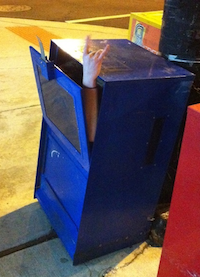Editor’s note: After two years here at Nieman Lab, Caroline O’Donovan is leaving us for BuzzFeed. We’ll miss her! On the occasion of her departure, she looks back on her time making media about media.
The other day, someone called me at work and asked me, What’s the future of journalism? As calmly and politely as I could, I replied, I don’t know what the future of journalism is.
I’ve been asked to predict the future a couple of times. It comes with the territory I guess. What are the hot trends?, people want to know. Where do you see this all going? They want to hear about drones and wearables, lists and quizzes, social media reporting and viral content strategies. They want optimism — solutions journalism!
Media reporting is a strange beat, characterized by a very niche, very loyal, very enthusiastic audience. Hamilton Nolan has a funny post on Gawker today that is ostensibly about Jill Abramson’s book deal, but is actually about media reporting, and the way in which its perceived importance is a direct inverse of its actual importance. Nolan is, of course, a sometime media reporter himself, and he has defended the importance of what he considers to be a dying practice. But he remains clear-eyed:
As a participant in the news media’s battles to remain the bedrock of an informed society, allow me to point out: most people don’t care about this. News about the media is hands-down the single category of news whose importance and public appeal is most overestimated by people who are employed in all aspects of the media.
A few months ago, I actually pitched a piece of media criticism to Gawker myself. I wanted to decry a trend I saw popping up all over the place, known as the “recent Internet history.” The general idea is to track a meme from its birth, detailing how an image or a phrase grows from a single user to a subculture of users to widespread adoption. The critical inquiry of these pieces, which usually involved no more than a Twitter search, was surface-level, I wanted to argue. The format is navel-gazing, interesting only to those whose lives revolve around tweets; only journalists write these stories, and only journalists read them.
But the piece fizzled because, riled up as I was, when it came time to write it, I couldn’t make it angry enough. Who was I really mad at, anyway? I asked myself. Is this about web writers doing shoddy, self-centered journalism, or is it about the sense of vertigo media reporting starts to give you after a while? The warm embrace of abject cynicism grows tempting when you’ve been staring into the content abyss for too long. Anyone who reads my garbage tweets knows what I’m talking about.

But as my friend (and former Nieman Fellow) Betsy O’Donovan (no relation) recently pointed out, the line between healthy skepticism and obliterating cynicism is an important one. In fact, Betsy made this point when writing about the sudden passing of widely beloved and appreciated media reporter David Carr.
Everyone’s written about him, thousands of words of eulogy. I’ll just say that Carr managed the trick that I most admire: He was skeptical without ever seeming cynical. In fact, he seemed as skeptical of cynicism as he was of any other pat answer.
So don’t ban media reporting. In fact, I think everyone should be a media reporter, at least for a while. This beat gives reporters something truly rare: the time and space to really observe the industry in which they’re toiling. The thousand-foot view of the media landscape that I’ve been afforded is invaluable, and will remain an asset as I navigate the rest of my career in journalism. I wish more reporters had the same opportunity.
I don’t know what the future of journalism is. I know that Snapchat isn’t television. I know that blogs aren’t dead. I know that Twitter isn’t over. I know that people still read print. I know what CPMs publishers want, and I know what CPMs publishers get. I know some, but not all, of the tricks they rely on to nudge those numbers up. I know that brands can sell — really sell. I know that storytelling is a buzzword. I know that not all content is created equal.
I do worry about the constant churn of posts and stories and articles in this industry. I wonder sometimes if anyone understands what the motivation behind all the content is. I worry about young writers with big platforms who don’t get the editing, the support, and the guidance that they need. I do not worry about young readers, who are getting more information, news, and entertainment funnelled at their shiny plastic brains in more creative and unique ways than ever before in human history.
 I believe that, in the future, journalism is going to be okay. I believe in a better CMS. I believe in wildly absorbing interactive news apps and games. I believe in beautiful stories told in VR.1 I believe in drone-assisted investigations, in nonprofit reportage, in small magazines, in speedy and secure communication between journalists and sources, in data big and small.
I believe that, in the future, journalism is going to be okay. I believe in a better CMS. I believe in wildly absorbing interactive news apps and games. I believe in beautiful stories told in VR.1 I believe in drone-assisted investigations, in nonprofit reportage, in small magazines, in speedy and secure communication between journalists and sources, in data big and small.
And I believe, as ever, in great content.
Caroline O’Donovan will soon be a senior technology reporter focusing on labor, the workplace, and human rights at BuzzFeed.